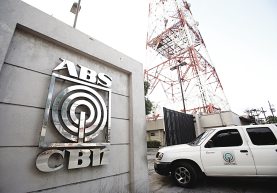
INQUIRER file photo / RICHARD A. REYES
MANILA, Philippines — As the public awaits action from the House committee on legislative franchises on the issue of ABS-CBN, can the committee be discharged from handling the case and instead head straight to plenary discussions?
The short answer to this question is yes, according to Agusan del Norte Rep. Lawrence Fortun who used as a reference the rules of the House of Representatives.
The process of doing so, however, is not as simple as a yes or no.
Section 50, Article X of the Rules of the House of Representatives states that “any member can present to the Secretary General a motion in writing to discharge a committee from the consideration of a bill or resolution referred to it if such committee fails to act thereon after more than thirty session days from its referral.”
Once a member of the House has filed a written motion to discharge before the Office of the Secretary General, the Secretary General shall arrange a place where members can affix their signature in support of the motion.
“A signature may be withdrawn by a member in writing at any time before the motion is entered in the Journal,” the House rule states.
Once 20 percent of the members of the House has signed the written motion, it shall be included in the Calendar of Business and reported in the next session of the House.
Currently, there are 302 members of the House. This means that 61 members need to sign the written motion.
What happens next?
Section 51, Article X of the House Rules states that after the Privilege Hour on any Monday, any member who signed the motion to discharge may demand for the motion to be tackled by the plenary.
This, however, cannot be done during the last 15 days of a regular session.
“The House shall proceed to vote on the motion after debate thereon for a period not exceeding thirty minutes,” the Rules of the House states.
If the motion to discharge is adopted, another motion shall be in order—this time, a motion to proceed.
If the motion to proceed prevails, the bills or resolution shall be tackled in the plenary “immediately”.
What happens if motion to discharge is not adopted?
According to the rules, if a motion to discharge is lost, “it shall not be in order to entertain any other motion to discharge the same committee or any other committee from the consideration of the same bill or any other bill with substantially the same subject matter during the same session year.”
“After the House acts on the motion to discharge, all other motions to discharge relating to bills or resolutions with similar subject matter which are pending in the Calendar of Business shall be stricken off the Calendar and shall not be acted upon for the remainder of the same session year,” it added.
In the case of ABS-CBN, Fortun said that the bills seeking to renew the franchise of ABS-CBN has been referred to the House committee on legislative franchises as early as August 2019, thus making them qualified under the rules.
Republic Act No. 3846 requires television and radio broadcasting companies to secure a franchise from the government before they are allowed to operate. It is Congress that will decide whether to extend the franchise to public utilities, such as the media.
At least 11 bills have been filed in the House seeking to renew the franchise of ABS-CBN, which is one of the biggest media outlets in the country. Its franchise is set to expire on March 30.
But despite the number of bills filed in support of the renewal of the media giant’s franchise, the House committee on legislative franchises has yet to tackle the issue.
In a press briefing, Isabela Rep. Antonio “Tonypet” Albano, however, assured that the committee has been “working hard to facilitate all the franchise renewals and applications that has been lodged in our committee.”